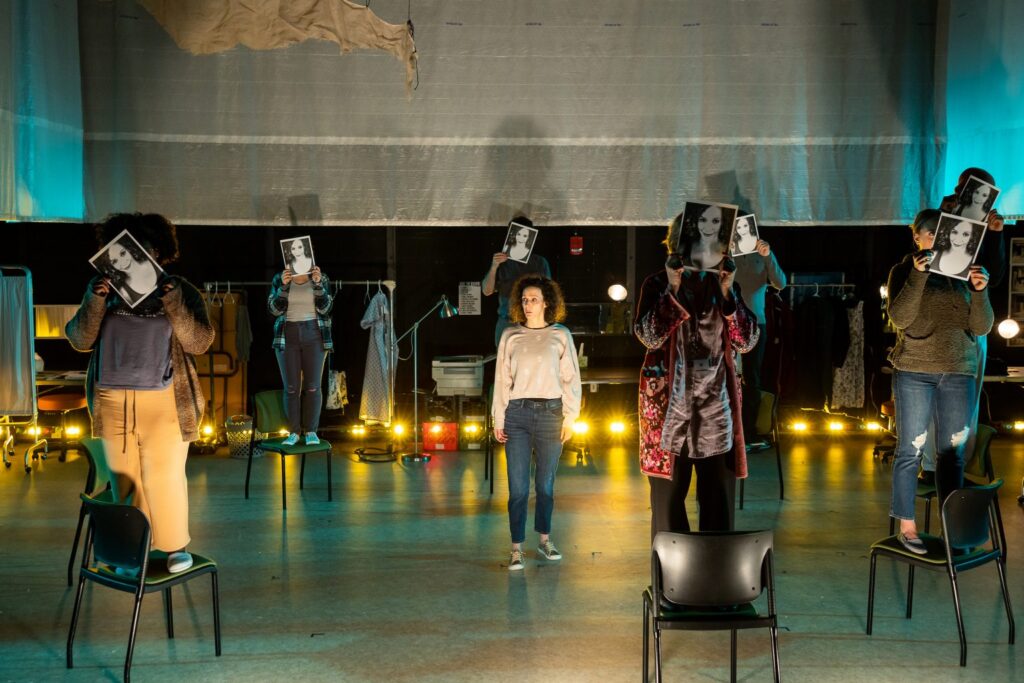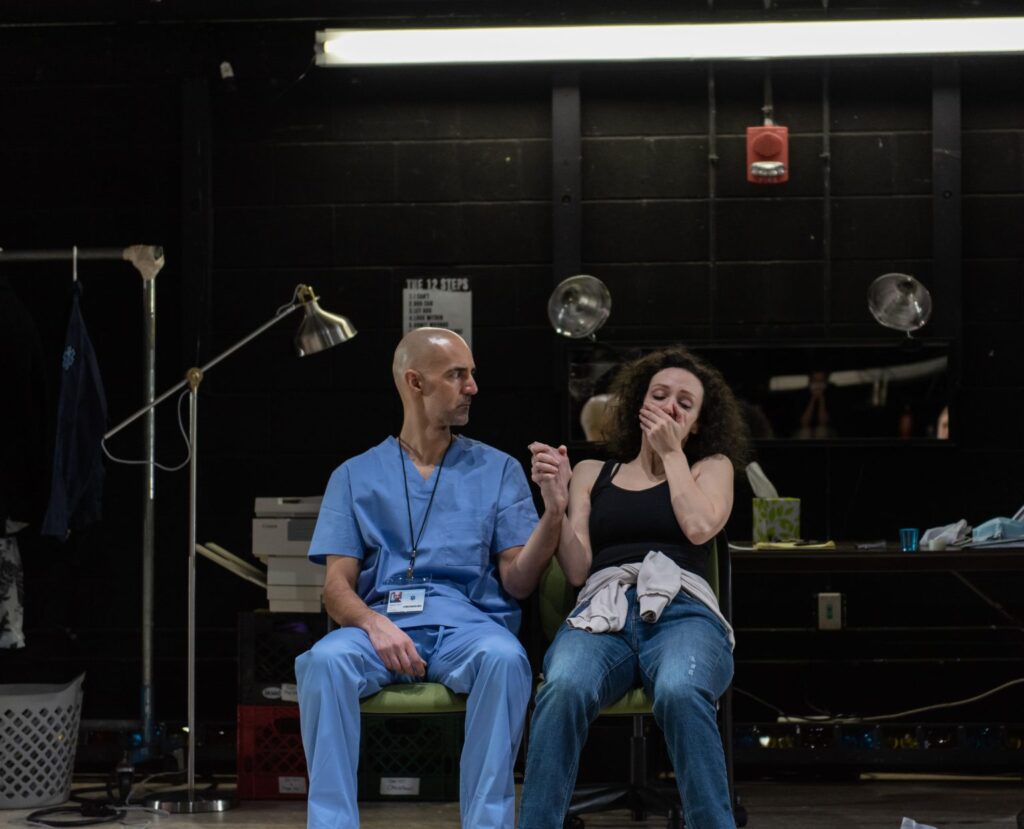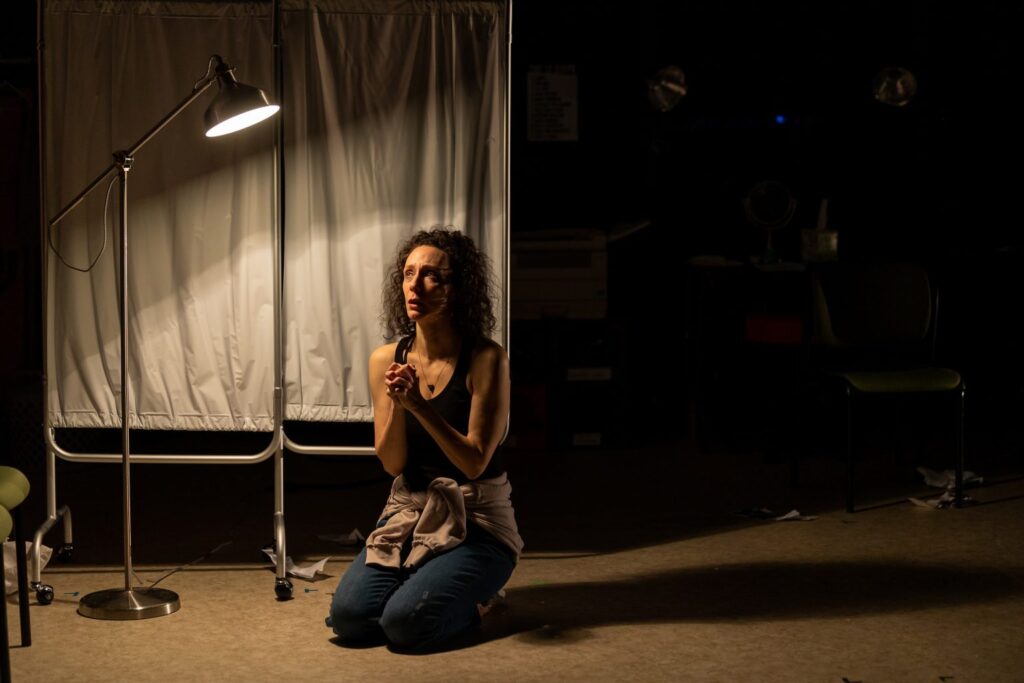
‘People, Places & Things’ — Written by Duncan Macmillan. Directed by David R. Gammon;, Scenic Design by Jeffrey Peterson; Costume Design by Gail Astrid Buckley; Lighting Design by Jeff Adelberg; Sound Design by David Wilson, Video Design by Adam Stone. Presented by SpeakEasy Stage Company at Boston Center for the Arts through March 5.
by Shelley A. Sackett
Like Jonah’s whale, addiction can swallow us whole. Unlike Jonah, however, who was freed after a mere three days of praying and repenting, those stuck in the belly of the addiction beast have a much tougher, longer and shakier road to hoe.
Some are up to the challenge and some crumble under the beast’s daunting weight. Some make it and some fake it. Some don’t know the difference and some could care less. And some will circle their self-destructive drain as long as they can, all the while ferociously denying they’re about to drown.
People, Places & Things, SpeakEasy Stage Company’s first-rate, must-see production, covers a lot of ground and checks a lot of boxes. Playwright Duncan Macmillan unsentimentally tackles the uncertain journey from addiction and recovery and the many shapes and forms it can take. For two and a half hours, the audience is in the thick of the raw process of rehab, detox, group therapy, relapse and the harrowing realization of what “one day at a time’ really looks like.

If this sounds like a maudlin, predictable trope, it is anything but. Working with Macmillan’s sharp, incisive script, director David R. Gammons has created a phantasmagoria with flashing strobes (light design by Jeff Adelberg) and vibrating sounds (David Wilson) that make us feel like we are marching right beside these crumbling, addicted minds on the verge of self-destruction. He has also amassed a splendid ensemble cast to bring the script to life, most notably the exceptionally talented Marianna Bassham as Emma. Her performance alone is reason enough to high tail to BCA.
The play opens as a play within a play, with a backstage section with costumes and make up tables visible behind a curtain that bisects the sparse set. In the forefront, an area rug and furniture mark the set of Chekhov’s The Seagull, which the audience is plopped into as if dropped from a time machine. It is the final act and the main character Nina (played by Emma/Bassham) is on stage, holding a stuffed seagull and delivering a tragic speech. All seems normally Chekhovian until it becomes obvious that this Nina is completely out of it. She stumbles, blunders and eventually falls, taking the entire stage with her and plunging the set into darkness.
As the lights come back up, we are in the reception area for rehab and Emma is about to let us through the keyhole of what it means to live in her chaotic inner and outer world. The impossibly willowy Bassham is mesmerizing. Her staccato cadence and flawless timing, fluid physicality and frantic attempts to minimize the seriousness of her addiction are simultaneously heartbreaking and hilarious. Macmillan knows his way around clever dialogue and director Gammons has a powerhouse to deliver them in Bassham.

The intake scenes with the Doctor (an excellent Adrianne Krstansky, who also plays the therapist and Emma’s mother) clue us in to the obstacles Emma will face on her road to recovery, which demands truthfulness as a non-negotiable first of 12 steps. She is an actress, we slowly realize, whose stage is both life and theater. The lines between acting and living her life have become so blurred that when she gives her name as “Nina,” her most recent role, we half believe she believes it.
In fact, she thinks she just needs “a tune up” and is only checking into rehab because no one will hire her unless she is certified as clean. This is all one colossal opportunity for her to both write the script and star in it. She’s not even willing to talk the talk, let alone walking the walk, “Drugs and alcohol have never let me down,” she declares. “Addiction is a parasite. It will eat you until you’re dead,” the Doctor counters.
Once she is admitted, the bulk of the play is a behind-the-scenes look at residential rehab, from group therapy sessions to tragic relapse and back again. As always, the immensely talented Nael Nacer (Mark) is a standout. A fellow addict, he befriends Emma and holds her feet to the fire. He really cares about his recovery and he cares about her.

Mark has been around the rehab block and knows that recovery cannot happen without honesty, both with oneself and with others. Nacer brings confidence and decency to the role, a casual elegance that makes Mark seem genuine and transparent. He is the perfect foil to Emma’s desperate hiding behind defiance and lies. “If I’m not playing a character, I’m not sure I’m really there,” she finally admits.
There are moments of real surprise and pathos. In particular, a powerful scene when post-rehab Emma tries to make amends to her parents sheds unexpected light on the possible underlying reasons for Emma’s addictions and low self-esteem.
Macmillan has certainly given us plenty to chew on and posed some provocative, core questions. How do we make sense of a world that feels like it’s spinning out of control without self-medicating? How do we live an honest life in a world built on lies, where people reinvent themselves on social media and the “news” embraces alternative facts? How do we let go of control in the midst of chaos? How do we learn to love and be kind to ourselves? And, most importantly, how do we acknowledge those people, places and things that render us powerless over addiction — and then have the courage to leave them behind? For more information and tickets, go to: https://www.speakeasystage.com/

